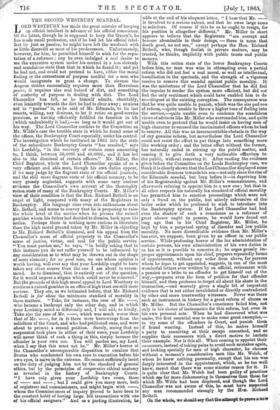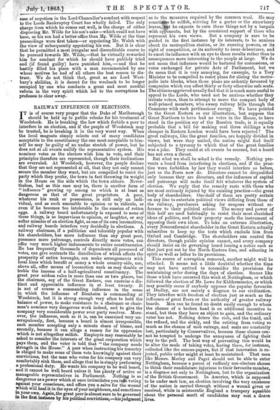THE SECOND WESTBURY SCANDAL. L ORD WESTBURY has made the great
mistake of keeping an official intellect in advance of his official conscience. Of the latter, though he is supposed to keep the Queen's, he has made small profession, and if he had let his official intel- lect lie just as passive, he might have left the woolsack with as little discredit as most of his predecessors. Unfortunately, however, for him, he permitted himself to wish for the repu- tation of a reformer ; nay he even indulged a real desire to see the executive system under his control in a less slovenly and scandalous state thanthat in which he found it; and yet he had not, and could not pretend to have, either the moral feeling or the earnestness of purpose needful for a man who would inaugurate so great a change. To cleanse the Augean stables successfully requires more than Herculean power, it requires also real hatred of dirt, and something of austerity of purpose in dealing with dirt. The Lord Chancellor has felt, as he himself admits, charitably, even leniently towards the dirt he had to clear away; anxious not to "pursue" it, as he said of Mr. Edmunds, to its last resorts, willing, nay desirous, to let it retire on good-service pensions, as having efficiently fulfilled its function in life (which undoubtedly it had),—so long as it would get out of his way. The Lord Chancellor confides to the Committee on Mr. Wilde's case the terrible state in which he found some of the offices, the Bankruptcy Court especially, under his control. The investigation which he instituted in 1862 into the state of the subordinate Bankruptcy Courts "has resulted," says his Lordship, "in the recovery of certain sums amounting to, I think, between 30,000/. and 40,000/., and it has led also to the dismissal of certain officers." Mr. Miller, the Chief Registrar, whom the Lord Chancellor speaks of as a very efficient and able man, though his own duties appear, if w e may judge by the flagrant state of his official journals, and the still more flagrant state of his official memory, to be very grossly neglected, supports with some very curious evidence the Chancellor's own account of the thoroughly rotten state of many of the Bankruptcy Courts. Mr. Miller's view of their condition is that the Hon. Richard Bethell is an angel of light, compared with many of the Registrars in Bankruptcy. His language rises even into enthusiasm about Mr. Bothell, and seems to convey that he is proposing to raise the whole level of the service when he presses the ruined ambler whom his father had decided to dismiss, back upon his notice. Perhaps there is nothing more curious in literature than the high moral ground taken by Mr. Miller in objecting to Mr. Richard Bethell's dismissal, and his appeal from the Chancellor's sense of official propriety to the Chancellor's sense of justice, virtue, and zeal for the public service. "You must pardon me," he says, "in boldly asking that in this instance you do not suffer yourself to be influenced by any consideration as to what may be thrown out in the shape of mere clamour; for no good man, no one whose opinion is worth having, will ever say that your Lordship ought to have taken any other course than the one I am about to recom- mend. As to dismissal, that is entirely out of the question, for it would impose a stigma which could never be removed." But the grounds of this high moral appeal to Lord Westbury to continue a ruined gambler in an office of high trust are still more curious. They are, as we intimated before, that Mr. Richard Bethell is far above the minimum standard of morality in these matters. "Take, for instance, the case of Mr.
who became a bankrupt only the other day, and in which your Lordship acted so differently, and, I will add, so kindly. Take also the case of Mr. —, which was much worse than that of Mr. --, for in it there were borrowings from the solicitors of the Court, and who had petitioned once, and were about to present a second petition. Surely, seeing that no suspension took place in either of their cases, your Lordship will never think of such a thing in this, simply because the offender is your own son. You will pardon me, my Lord, when I say that this must not be." Mr. Miller's horror at the Chancellor's unconquerable disposition to emulate that Brutus who condemned his own sons to execution before his own eyes, is naive in the extreme. He cannot sufficiently insist on the duty of judging him not by the standard of general ethics, but by the principles of comparative ethical anatomy as revealed in the history of Bankruptcy Courts. "I have only given your Lordship two cases, those of — and —; but I could give you many more, both of registrars and commissioners, and might begin with —, whom the Commissioners of inquiry proved to have been in the constant habit of having large bill transactions with one of his official assignees." And as a parting illustration, be adds at the end of his eloquent letter, "I hear that Mr. is involved to a serious extent, and that he owes large sums to solicitors. Of course if this be so he ought to resign, for his position is altogether different." Mr. Miller in short appears to believe that the Registrars "are corrupt and become abominable in their doings, — there is none that doeth good, no not one," except perhaps the Hon. Richard Bethell, who though foolish in private matters, may be trusted, he thinks, implicitly with public trusts and public moneys.
With this rotten state of the lower Bankruptcy Courts before him, no man was wise in attempting even a partial reform who did not feel a real moral, as well as intellectual, humiliation in the spectacle, and the strength of a vigorous resolve to remove this scandal against public morality. It- was the misfortune of the Lord Chancellor that he did feel the impulse to render the system more efficient, but did not feel the only sentiment which could have enabled him to do so—disgust at the existing corruption. The consequence was that he was quite unable to punish, which was the sine gad non-- of reform,—quite unable to throw a higher tone of feeling into the service,—quite unable even to condemn the scandalous views of advisers like Mr. Miller who surrounded him, and quite- unable even to pretend that he would insist on having men of high character to succeed the incriminated officers whom he had to remove. All this was an insurmountable obstacle in the way of any genuine reform, but nevertheless the Lord Chancellor could not resist the effort to put things into something more- like working order ; and the latter effort without the former, has naturally ended in stirring up the putrid matter, and causing it to give forth a very noticeable effluvium to the public, without removing it. After reading the evidence- given before the Committee on the Leeds Bankruptcy case, we- think it is clearly shown that the Lord Chancellor displayed some- considerable firmness towards his son—not only since the rise of the Edmunds scandal, but long before it—in depriving him of his Registrarship against Mr. Miller's remonstrances, and afterwards refusing to appoint him to a new one ; but that in all other respects his naturally lax standard of official morality has permitted him to sanction proceedings which were not only a fraud on the public, but utterly subversive of the. better order which he professed to wish to introduce into- the Bankruptcy system. If the Lord Chancellor had had even the shadow of such a conscience as a reformer of great abuses ought to possess, he would have found rout long ago that in his Chief Registrar, Mr. Miller, he- kept by him a perpetual spring of disorder and low public morality. No more discreditable evidence than Mr. Miller's. has ever, we suppose, been given by an officer in our public service. While professing horror of the lax administration of certain persons, his own administration of his own duties is as lax as it is possible to conceive it.;- he urges grossly im- proper appointments upon his chief, prepares repeatedly forms. of appointment, without any order from above, for persons whom he hopes to get appointed, suggests, in one of the most wonderful letters ever written by an official, retirement with a pension as a bribe to an offender to get himself out of the way,—prepares even the form of petition for that offender himself, and then professes to forget all about his share in the transaction,—and scarcely gives a single bit of important. evidence that is not either invalidated or directly contradicted by other and more trustworthy witnesses. Never was there such an instrument in history for a great reform of abuses as Mr. Miller. But the Chancellor's conscience failed him, not. only in his choice of instruments for this reform, but even in his own personal acts. When he had discovered what was amiss, the first essential was to make some great examples,— to try some of the offenders in Court, and punish them if found wanting. Instead of this, he makes himself a party to conniving at their escape unscathed, and so- supplies their successors with a direct motive to imitate their example. Nor is this.all. When coming to appoint their successors instead of taking pains to avoid such mistakes again, and looking specially for men of high character, he chooses without a moment's consideration men like Mr. Welch, of whom he knew nothing personally, except that his son was- deeply interested in the appointment, which, as he too well knew meant that there was some sinister reason for it. Ib- is quite clear that Mr. Welch had been guilty of practices which ate far more dishonouring in themselves than those for which Mr. Wilde had been displaced, and though the Lord Chancellor was not aware of this, he must have suspected any man recommended strongly by the Hon. Richard Bethell. On the whole, •we should/ay thetthealiemptrtocuswe a new case of nepotism in the Lord Chancellor's conduct with respect to the Leeds Bankruptcy Court has wholly failed. The only charge from which he comes out well, is the charge of either displacing Mr. Wilde for his son's sake—which could not have been, as his son had a better office than Mr. Wilde at the time proceedings were first taken—or appointing Mr. Welch with the view of subsequently appointing his son. But it is clear that he permitted a most irregular and discreditable course to be pursued towards Mr. Wilde,----that he virtually rewarded him for conduct for which he should have publicly tried and (if found guilty) have punished him, — and that he hastily filled his place with a man recommended by one whose motives he had of all others the best reason to dis- trust. We do not think that, great as are Lord West- bury's abilities, it is decent for the woolsack to be longer occupied by one who conducts a great and most needful reform in the very ,spirit which led to the corruptions he professes to clear away.































 Previous page
Previous page